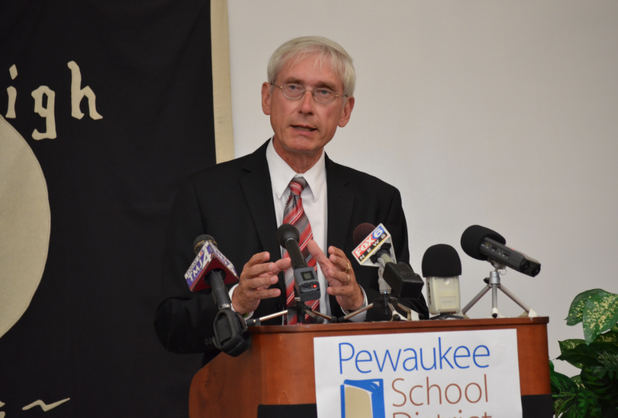
by Christian D’Andrea
MacIver Institute Education Policy Analyst
Superintendent Tony Evers lauded changes that will raise educational standards throughout Wisconsin’s public schools in Thursday’s annual State of Education address. Wisconsin’s progress after earning a waiver from federal No Child Left Behind standards, Evers said, will shape the face of education for years to come.
“This is an exciting time for Wisconsin,” Evers said to a Capitol Rotunda crowded with educational leaders from across the state. “We are changing what our children learn, how they are taught and tested, and how our teachers are evaluated…and we are making this change at an unprecedented rate.”
Evers was referring to the Department of Public Instruction’s Agenda 2017, which folds together several aspects of reform from early childhood reading initiatives to stronger standards for students in order to build a more comprehensive course for public education. That agenda includes an overhaul of the state’s standardized testing program, new accountability programs for schools in the wake of No Child Left Behind, a stronger commitment to vocational technology in the classroom, and a greater focus on college and career readiness.
The Superintendent touched on the state’s successes – strong national rankings in aspects like graduation rates and NAEP scores – before addressing some of the problems that he hopes to overcome in the near future. The achievement gap – the wide difference in graduation numbers between the state’s white students and minority students – made its usual appearance on Evers’s list of problems that need to be solved. This lapse in preparing students for either higher education or the workforce has become one of Wisconsin’s highest-priority issues.
Several reforms, argued Evers, should help remedy that problem. The Read to Lead program, an early education initiative to improve literacy before third grade, will help raise young students up. A stronger commitment to STEM (Science, Technology, Engineering, and Math) tenets, a greater relationship with business leaders, and an emphasis on the state’s technological programs will help guide more pupils to the workforce as well.
However, the biggest effect may come from reform in the state’s standards for students and classrooms. A shift to nationally-normed Common Core of Data standards will help drive curricula and give both teachers and parents a better idea of just how much their children are progressing.
“No more will we have curricula that are a mile wide and an inch deep,” announced Evers.
The address also touched on the cadre of tests that will replace the outdated and ineffective Wisconsin Knowledge and Concepts Examination – a statement that garnered a big round of applause from an audience filled with educators. By 2014, the state will move on to tests developed by the SMARTER Balanced Assessment Consortium, which will provide a more thorough online analysis of student growth and provide higher standards for the state’s pupils. Students in high school will also be transitioned from WKCE exams to an ACT testing suite. That move, which will include four different tests between ninth and 11th grade, is a strong step towards increasing college readiness for children in the Badger State.
Evers closed by bemoaning the funding cuts that tightened budgets in several districts across Wisconsin. He called for a reinvestment in public education to help restore libraries and classrooms across the state. He also used the opportunity to stump for his Fair Funding plan, which would begin to reform the state’s complex funding formula for public schools.
“We need all hands on deck,” concluded Evers. “I’m jazzed about the future. I hope you are too.”